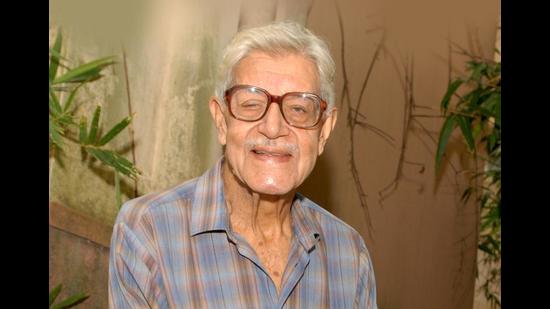Keshav Datt: A life and career shaped by Partition
He played every minute of India’s gold medal campaigns in 1948 and 1952 Games and was good enough for a third Olympics
Two-time Olympic hockey champion Keshav Datt died of age-related illness in Kolkata in the early hours of Wednesday. He was 95.

Datt was the last surviving member of the teams from independent India that won the hockey gold in the 1948 and 1952 Olympic Games. He was an integral member of both campaigns, as evident from the fact that he played every minute of India’s eight matches in London and Helsinki, as either right half or centre half, even while many of his teammates were rested and rotated to give each member of the squads a game. Datt was the vice-captain in 1952.
Datt always believed he could have gone to the 1956 Olympic Games in Melbourne too, but for the demands of his job in the tea industry in the city then known as Calcutta. “Once I joined tea, there was no time. And it was hard work. But I couldn’t afford to chuck that job in the hope of getting something equally good,” Datt recalled during an interview conducted in 2013. Gurbux Singh, who won the Olympic gold in 1964 and a bronze in 1968 and played against Datt in domestic competitions, still thinks Datt was right. “He was in prime form (in 1956), certainly good enough to make the India team,” Singh said on Wednesday.
A product of Partition
Datt’s life and hockey career were shaped by the most traumatic event in the history of the Indian subcontinent in the 20th century: Partition.
One of seven siblings, Datt was born in Lahore on December 29, 1925 and grew up in a joint-family. His father was called Pandit Ishwar Datt; “Pandit because we were brahmins,” Datt explained. His mother Sushila Devi “was from Kashmir.” The family belonged to Lahore, but Partition forced them to leave and never return. “We lost our home, we lost everything…never thought we would have to say goodbye to Lahore, to the house. I still miss that place,” Datt remembered in 2013. He never got the chance to visit Pakistan.
Also read | Dilpreet, Lalit and Indian hockey’s tale of second chances
Pitfalls await anyone trying to read into a man’s life the history of a subcontinent, but that is not because one is more complex than the other. Individuals, too, find themselves at the intersection of contesting historic forces and must navigate their way as well as they can. A couple of examples from Datt’s life and career illustrate the point.
Two cities steeped in colonial history in what would become two different countries made Datt the man and the champion that he was. He learnt the game in Lahore, following in the footsteps of elder brother Yogesh, and honed his skills while studying in Government College, Lahore, a bequest by the British government. But Partition forced Datt, like millions of others, to find a home elsewhere and he ended up making a name for himself on the other side of the border in independent India. After a brief stay in Bombay, during which he went on a goodwill tour of East Africa under Dhyan Chand in 1947 before being selected for the 1948 London Olympics, Datt finally settled down in Calcutta, the erstwhile capital of British India that still flourished as an economic centre.
Consider also how Datt initially came to Calcutta to work for the Port Trust, one of the departments that formed the bulwark of British government in India, before shifting to private employment in a British tea company. Yet, except for the short while when he worked and played for the Port Trust alongside Olympians Joe Galibardy and Leslie Claudius in the “Olympic half-line”, Datt spent his entire hockey career in Mohun Bagan, a club formed in the late 19th century primarily as a challenge to British hegemony in the field of sport and outside.
A different era?
Datt and his generation certainly belonged to a bygone era where even elite sportspeople had to earn their keep doing regular jobs. “Today, at least at the highest level, players are looked after much better. Not like us, who had to go to even the Olympics on without pay leave,” said Gurbux. Yet there are many similarities too. Again, a few examples may suffice.
Also read | Lack of games not a worry for captain Manpreet and coach Reid ahead of Olympics
Datt’s first love was badminton. However, “badminton was considered a ladies’ game, which was, you know, unfair,” said Datt. He shifted to hockey, “but badminton helped me with my footwork because it’s a very fast-moving game.” So, playing different sports in the formative years is a good idea whichever era you are in.
The other thing to remember is what made Datt so good; it was not rage against circumstances beyond his control, nor the need to prove something to others. It was far more elemental: “I am a person, by birth, if I take on something I want to be extremely good at it, far above average. It’s in my blood you might say. I don’t like also-ran sort of business,” Datt had said, without a trace of hubris, in the interview.
This is the same man who gave away his 1948 Olympic gold medal to the prime minister’s relief fund in the wake of Chinese aggression on the Indian borders in 1962. Again, something for us to ponder over as we negotiate times that are more stable in certain ways, and far more uncertain in others. “A great player and a thorough gentleman,” is how Gurbux Singh remembers Datt. We will likely not get more champions like him.
Datt is survived by daughter Anjali and sons Kiron and Arun.
(Nikhilesh Bhattacharya has a Phd on the contribution of Anglo-Indians in Indian hockey. He teaches English Literature in a college.)
Continue reading with HT Premium Subscription




